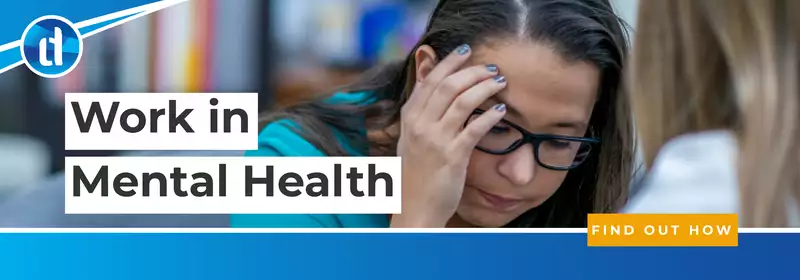Support for mental health issues can take many forms, often depending on whether they’re mild, severe or enduring disorders. As such, the job opportunities relating to mental health are very diverse and many don’t require university level qualifications. In any case, if you’re interested in a career in this area, you can study for a mental health role with an online course.
Individuals experiencing mild symptoms of mental health issues can often go about their lives with little assistance. Especially since research suggests that 36% of common mental health disorders go undiagnosed.
Those who are aware may visit mental health professionals for counselling sessions to talk about their issues and feelings. Or need to see a specialist on occasion to assess their medication.
Others who experience more severe or enduring disorders can require more intense levels of support. From inpatients requiring round the clock care to those receiving assistance at home. In this instance, a broad number of mental health professionals can be involved with their treatment and support.
With so many important roles involved with mental health care and support, you have a real chance of finding your perfect career.
To help you decide, we’ve detailed different roles that do and don’t require degree level qualifications. Plus, why you should be comfortable studying for a mental health role online.

Why consider an Online Course?
Before you explore career options, you need to be confident that studying for a mental health role online is wise. For many, online courses are still an unfamiliar learning style. But rest assured, they’re an excellent way to kick start your mental health related career.
To begin with, if a course delivers a recognised qualification, it’s the same whether it’s on or off-line. So, if you’re studying an A Level in psychology at home or on campus, you’ll get the same learning outcome.
Ofqual (the Office of Qualifications and Examinations Regulation) regulate all awarding organisations. This ensures every student gets the same treatment and their qualifications are scored, graded, and recognised in the same way.
Because there are fewer costs involved with running online courses, the savings are passed onto students. So you can qualify for less. The lower prices also mean there is less risk for online course providers to deliver specialist courses as they don’t need a minimum number of students to make the course profitable.
This makes it more likely you’ll find the exact course you need or want to study with a distance learning provider. The flexibility of online learning also means you can study when and where you please. So you can learn around your current job or family care commitments.

Mental Health Roles that Don’t Require a Degree
While mental health roles require you to have relevant knowledge, many are accessible with A Levels or diploma level study.
Mental Health Support Worker
Provide assistance and basic care to clients with a range of mental health issues or illnesses. Helping them cope with their challenges and achieve their personal goals. Depending on the severity of their challenges, you could work in supported accommodations, psychiatric units or in the individual’s home. No set qualifications are required, but courses and certificates in mental health will help your application.
Counsellor
Work with clients to help them address their mental health issues. Helping them to look at their values, core beliefs and enabling them to explore their behaviour patterns. Most roles require you to have professional training and be a member of a professional body. This necessitates qualifications at diploma level, which you can work towards with various online counselling courses.
Psychiatric Technicians
Work in psychiatric hospitals, residential mental health facilities and other related healthcare settings. Covering a range of duties like talking to patients about their issues and leading activities with potential therapeutic benefits. All the while documenting your observations of patients. You can enter this role with a post-secondary certificate such as a Level 3 Certificate in Understanding Mental Health.

Professional Mental Health Roles
For the best chance of career progression and entry into professional roles in mental health, you’ll need degree-level qualifications. These typically give you more sensitive cases to work on and further responsibilities surrounding patient care. Professional roles also generally come with a higher salary, which can increase significantly with experience in your area.
Clinical Psychologist
Support individuals who are experiencing complex mental health issues like severe depression, bipolar disorder or other personality disorders. You can also help individuals with behavioural problems, learning difficulties, depression and anxiety. Generally, the support you provide takes the form of psychological treatments such as acceptance and commitment therapy, CBT or interpersonal therapy.
Clinical Psychologist is a legally protected title. It’s regulated and protected by law to ensure the public are treated by registered professionals.
To get registered, you need to complete an undergraduate degree accredited by the British Psychological Society (BPS). Then a Clinical Psychology doctorate before you can register with the Health and Care Professions Council (HCPC).
You can study an Access to Higher Education Diploma (Psychology) to get the qualifications to apply for your degree.
Mental Health Nurse
Help patients recover from their mental health issues or illnesses in hospitals, psychiatric wards, or out in the community. You’ll be qualified to deal with severe conditions like mania, depression or individuals with thoughts about ending their own lives. And you’ll work with the individuals, family members and other health care professionals to put together the best care plan for that person’s needs.
To become a mental health nurse, you’ll need a mental health nursing degree, which differs from those for standard nursing. This also needs to be approved by the Nursing and Midwifery Council.
To get started, you can study an Access to HE Diploma (Nursing), Social Science and Health, or Psychology. All would equip you with beneficial foundational knowledge for your mental health nursing degree.

Get Qualified for Mental Health Roles Online
Whichever route you decide to take, you can study for your chosen mental health role online.
To have the utmost freedom in career progression and movement, consider studying an Access to HE Diploma. As an A Level equivalent qualification, it allows you to progress to university should you wish to at any point.
So, you can get an education that enables you to enter the mental health field. Then, if you want a professional role at a later date, you can go onto study the necessary degree.
An Access to HE Diploma (Psychology) explores the workings of the human mind. It provides an opportunity to observe the full spectrum of human behaviour, from childhood to adulthood. As well as the methodologies behind diagnosis, treatment and support when issues are identified.
This would give you the best all round understanding of the mind ahead of your career and potential degree. Qualifying you for many roles in mental health and putting you on the path to others, should you wish to explore them.
learndirect is the leading UK provider of distance learning courses. Allowing you to be assured that the online courses you’ll study will be of exceptionally high standards.
Find out more about our Access to Higher Education Diploma (Psychology) by clicking below.



















